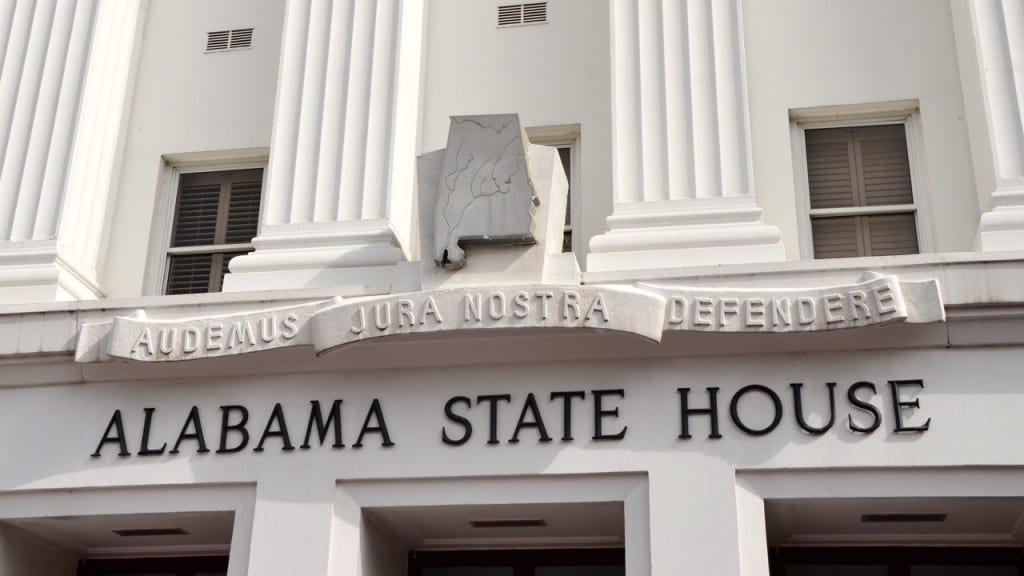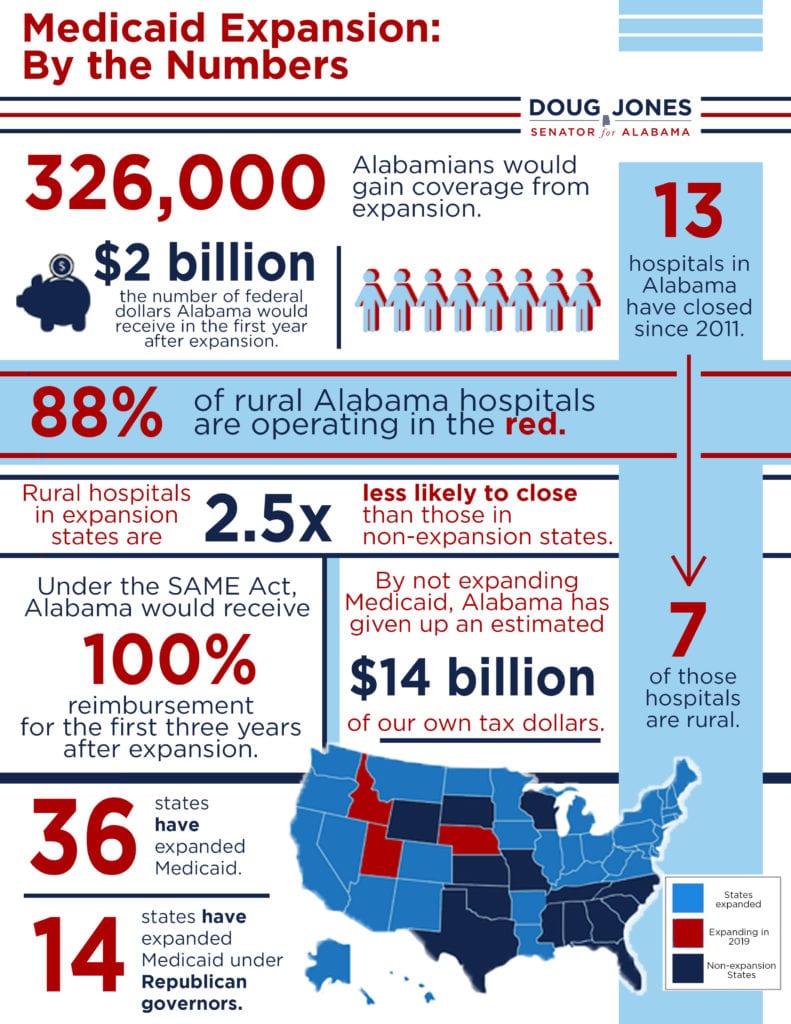Will the politicians in Montgomery listen? –
Alabama workers have sent $14 billion in Medicaid taxes to fund health care in other states over the past few years, money that could have been used at home to improve health and the economy –
By Glynn Wilson –
Simply for the sake of partisan politics, Republicans in Alabama have denied health care coverage to more than 300,000 people in the state for the past five years and let $14 billion in Medicaid taxes withheld from the paychecks of Alabama workers go to fund healthcare in other states like New York and California.
Let that sink in.
As the data continues to pile up about how expanding Medicaid in states improves the economy and health outcomes, however, and since President Barack Obama is no longer in office and the political lightening rod that he was back when the Affordable Care Act passed, the issue should no longer be a partisan issue, according to U.S. Senator Doug Jones of Alabama.
“By refusing to expand Medicaid, Alabama has turned away $14 billion of our own taxpayer dollars,” Senator Jones said this week in a press release and on Thursday in a media conference call with reporters.
“For years, those dollars could have helped keep our hospitals open, support good jobs in our communities, and provide health coverage for hundreds of thousands of Alabamians,” Senator Jones said. “This isn’t a partisan issue – expanding Medicaid is the right thing to do.”
He admitted that political opponents in the state will still fight it by saying they can’t afford to fund the state’s small part in the program.
“I say we can no longer afford not to do it,” Jones said.
As a member of the Senate Health, Education, Labor and Pensions (HELP) Committee, he was joined this week by Senator Mark Warner, a Virginia Democrat, and together they introduced the States Achieve Medicaid Expansion (SAME) Act of 2019. The legislation would ensure that states coming on board the Medicaid expansion bandwagon after 2014 would become eligible for the same 100 percent level of federal matching funds as states that expanded Medicaid from the beginning.
Alabama is one of 14 states still resisting Medicaid expansion largely on political grounds.
“Alabama can no longer afford not to expand, and our SAME Act legislation would ensure that states will get a fair deal when they do,” Senator Jones said. “I urge my colleagues on both sides of the aisle, and on both sides of Capitol Hill, to support this common sense bill.”
He also urged state leaders, including Republican Governor Kay Ivey and members of the state Legislature, which will be going into session soon, to take a hard look at the issue and do what it takes to support the health care industry in the state, just as they routinely invest in recruiting new industry with all manner of tax breaks and investment capital.
Leaders at Alabama’s hospitals have been warning public officials about the financial cliff they are facing, in large part as a result of the state’s refusal to expand Medicaid, Jones said. Since 2011, 13 hospitals have closed in the state, seven in rural areas where the pressure is mounting on the system in hospitals located in neighboring counties.
Another Hospital Will Close in Alabama Thanks to Lack of State Support
“Even now, approximately 88 percent of rural Alabama hospitals are operating in the red,” he said. “The Alabama Hospital Association estimates that some 326,000 Alabamians would gain health care coverage if Medicaid was expanded in the state.”
Numerous studies have shown that expanding Medicaid benefits states economically by increasing jobs and earnings growth, generating federal revenue, increasing Gross State Product, increasing state and local revenues and reducing uncompensated care and hospital costs.
If Alabama had expanded Medicaid five years ago, the Senator said, it could have yielded a $935 million net increase in tax revenue and led to about 12,000 new jobs — in 2016 alone.
In Virginia, Senator Mark Warner, the former governor, said Virginia failed to join the program at first, but has since seen the light.
“It’s crazy that for so many years, Virginia taxpayers were footing the bill for states that had already expanded Medicaid,” he said. “Today, Medicaid expansion is bringing billions of tax dollars back home to Virginia, and more than 400,000 Virginians have gained access to quality, low-cost or no-cost Medicaid coverage.”
The new legislation is also being co-sponsored by Democratic Senators Tim Kaine of Virginia, the former Vice Presidential Candidate, along with Tammy Baldwin of Wisconsin, Tom Carper and Chris Coons of Delaware, Angus King of Maine, as well as Gary Peters and Debbie Stabenow of Michigan. A similar bill was recently re-introduced in the House and co-sponsored by Congresswoman Terri Sewell of Alabama.
Background
Medicaid is a joint federal and state insurance program that covers medical costs for eligible low-income Americans.
In 2010, states were first given the option to expand their Medicaid programs to cover people who earn up to 138 percent of the federal poverty level. Under this deal, the federal government would cover the full cost of the expansion for the first three years, and gradually step down to cover 90 percent permanently, so states would only have to fund 10 percent of the program.
Back then, Alabama’s Republican governor Robert Bentley refused to even consider joining the Medicaid expansion program, fearing political opposition from the tea party political right. He and the Legislature continued to refuse participation even as they faced a major Medicaid funding crisis in 2016, when the state Medicaid program faced an $85 million a year shortfall.
At the last minute, as it became clear that about 1,200 people were dying in Alabama every year due to lack of affordable access to health care, which we showed in our original reporting, Bentley finally changed his tune on coming up with the money to fund the state health program. Yet he continued to refuse to take the federal billions, letting $14 billion from the paychecks of Alabama workers go to fund health care for citizens in other states over the past five years.
In a special session, the Legislature finally found $85 million a year in revenue from the BP Gulf oil spill lawsuit settlement fund to shore up Medicaid in the state over two years. It is not clear where the funding for that program stands now, since no one in Montgomery is talking about it, or the press is not reporting on it.
But if we had not gone to Montgomery back then and faced down the Legislature and put the media pressure on to find the money, more people would have died and the state’s economy would have suffered more. (We should have won a Pulitzer Prize for Public Service for this coverage, but I don’t practice journalism to win awards, but to make a difference, so I didn’t even enter the stories).
HUGE Medicaid Crisis Looms in Alabama
If the people and the rest of the state’s press and media would put on the pressure again this year to get the state to go ahead and expand Medicaid and stop sending those billions out of state, Alabama alone would receive $2 billion in federal dollars back in the first year.
The SAME Act would ensure that any states that choose to expand Medicaid get a second chance to receive these same levels of federal funding, Senator Jones said.
Under this bill, if it passed in both houses and was signed by the president, a state would receive three years of full federal funding. It would phase down to a 95 percent the next year, 94 percent in year 5, 93 percent in year 6, and 90 percent after that, when the Legislature would have to find a way to simply fund 10 percent of the program.
Thirty-three states and the District of Columbia have already expanded eligibility for Medicaid, and three more states – Idaho, Utah and Nebraska – have passed ballot initiatives to join the program.
In states that have failed to expand Medicaid, more than 2 million low-income adults fall into a “coverage gap,” the Senator said, due to incomes that are too high to be eligible for Medicaid, but too low to meet the limit that would allow them to receive tax credits to purchase affordable coverage in the health care marketplace.
“Without Medicaid expansion, most of these individuals are likely to remain uninsured, as they have limited access to employer coverage and frequently find the cost of unsubsidized marketplace coverage to be prohibitively expensive,” Senator Jones pointed out.
So more people are going to die needlessly, the economy of the state will continue to suffer, more hospitals will close, and Alabama will continue to fall behind other states in the country — if the political will is not found to join most of the states in the union to fund Medicaid expansion.
















As long as we have an in-place political and religious system that views anyone of color to have been created “inferior” and that those same exact people are draining the resources from the ruling white class compounded by the fact that the Washington GOP has stated on more than one occasion that health care is a COMMODITY and not a right-don’t expect much change. Not long ago it was members of the DC elite who actually argued with the Pope when he appealed for compassionate legislation-also the former senator from PA actually stated in an interview that Jesus NEVER championed “socialist” programs for the poor. This is the sad state we find ourselves in today.